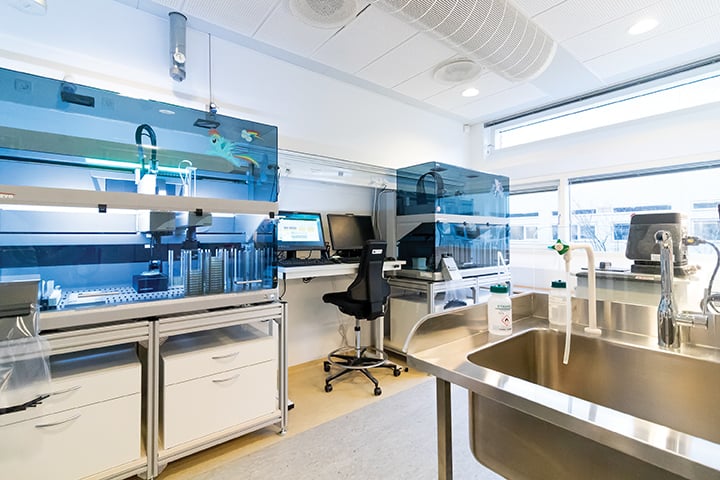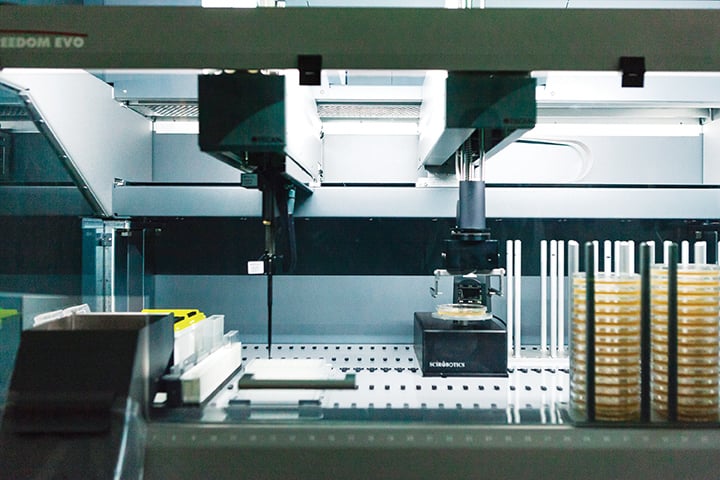Probiotics play an important role in animal nutrition, ensuring a healthy balance of gut microbiota to improve performance or productivity. Scientists at Christian Hansen are using high throughput liquid handling systems to fully automate sample inoculation and plating for research into novel bacteria for animal feed supplements.
‘Good’ bacteria are increasingly being added to foodstuffs such as yogurt and dairy products to improve nutrition and human health, and the agricultural sector is using the same approach to boost the health and productivity of livestock. Animal wellbeing is incredibly important to many farmers, who strive to produce food that is both high quality and sustainable. Christian Hansen (Chr. Hansen), a global bioscience company based in Denmark, has been committed to using natural ingredients for improved food and health for more than 140 years. Christel Galschiøt, senior laboratory technician in Stability, Formulation and Analysis (SFA) in the company’s Animal Health Innovation Division, discussed how they are developing beneficial bacterial strains as probiotics for poultry, swine and cattle: “We use both spore-forming bacilli – which are very robust and hardy – and lactic acid bacteria, that are more sensitive to stress in the form of heat or moisture. Our work involves growing up the different bacterial strains on agar plates and counting the successful colonies that form, before selecting strains for further testing.”

Freedom EVO platforms allow scientists at Christian Hansen to automate their inoculation and plating protocols
“As some of our cultures have up to a hundred billion bacteria per gram, the samples need to be diluted significantly before plating. If this was being carried out manually, it would mean performing 8-10 serial dilutions before spreading the bacteria onto the agar, which is incredibly laborious. In addition to the time factor, we also found that there was substantial variation between technicians; everyone has a slightly different pipetting technique or they hold the tube in a different way when vortexing the sample, and this can affect the results. As all our products must adhere to strict quality control standards and meet the criteria of relevant regulatory authorities, all of our work must be consistent and replicable, which was a huge contributing factor to deciding to automate our workflow.”
Following a recommendation from another group at Chr. Hansen, Christel got in touch with Tecan to discuss liquid handling automation. She continued: “We needed a system that could not only perform reliable plating, but that also had precision pipetting capability for our serial dilutions. The Freedom EVO® 200 was the best system for our workflow, as we could easily integrate a SciRobotics PetriPlater™ into the system. Our set-up can accommodate up to 60 standard plates at a time, which is fantastic, as it allows full automation of both the serial dilution steps and the plating of the samples. An integrated barcode reader also allows us to track the samples through each stage of the workflow, before transferring them to an external colony counter to avoid a backlog and keep the process running smoothly.”

An integrated SciRobotics PetriPlater supports this high throughput workflow
“We purchased two Freedom EVO platforms in 2015 and, since automating our workflow, we can run significantly more plates than we could have done manually,” Christel added. “In 2018, we prepared around 25,000 plates; achieving this high throughput by hand would have required several technicians, which isn’t cost effective and is not the best use of our time. The automated solution not only saves time, it has also increased our consistency between plates. We have also introduced nested tips into one of our platforms, which gives us a very high on-deck tip capacity. This means that we need to refill the tips a lot less frequently, and we no longer need to either reset the tip position or replace the tips during a run. This is fantastic, as we don’t have to worry about keeping an eye on the system while it’s running, or interrupt the workflow. We’ve also noticed that we are now using less plastic, as we are using the smaller volume tips where possible and, as the nested tips are sterile, this reduces packaging waste as well.”
The automated solution not only saves time, it has also increased our consistency between plates.
“When it came to setting up the system, Tecan offered very valuable assistance. The company’s application specialists helped us set up both the Freedom EVOware® script and some visual basic programs that were needed to create the worklists. They also supplied us with a template that helped us to adapt our scripts to incorporate the nested tips. This was slightly complicated, as we had to do some local optimization, but we also got very good advice from the helpline and technical staff. All in all, it was a smooth transition to automation, and we are very impressed with the service that Tecan has provided us with over the years,” Christel concluded.
To find out more about Tecan’s cell biology solutions, visit www.tecan.com/cellbiology
To learn more about Christian Hansen, go to www.chr-hansen.com/en









